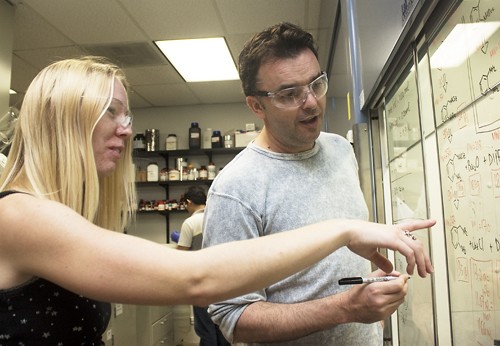A new grant will help UA researchers advance drug development.
The three-year, $1.1 million National Institutes of Health grant will help UA researchers continue to develop small molecules, the foundation of many drugs.
“”What we’re trying to do is make different kinds of molecules,”” said Victor Hruby, regents’ professor emeritus in the department of chemistry and biochemistry and researcher for the project. “”And then see if any of them, some of them, or most of them might be useful for drug development.””
Small molecules are already used in many medications, such as painkillers and drugs for high cholesterol and cancer.
“”Almost every drug you take orally is a small molecule,”” said lead researcher Christopher Hulme, professor in the College of Pharmacy.
The research is a collaboration between UA researchers and the Translational Genomics Research Institute in Phoenix. Their work started several years ago.
“”Research is not usually something that starts when you get a grant,”” Hruby said. “”It’s something that starts when you get an idea.””
Hulme said this specific grant funds the development of new molecular probes with the goal of going “”from bench to bedside.””
“”That someone could potentially in the future use to develop drugs,”” Hulme said.
Hruby said the grant will help with this goal.
“”It allows you to get a lot more done,”” Hruby said. “”What we’re trying to do now is put ourselves on the map much larger than a small group of people.””
The team has made about 10,000 potential small molecule probes over the past three months, according to Hulme.
“”We just need fast and expedited ways of exploring this huge, untapped chemical space,”” Hulme said.
Research challenges include gauging the reaction of the human body to the small molecule probes.
“”We’re interested in making things compatible with life. Most of our drugs are toxic, so you can only take so much of them,”” Hruby said. “”What you need to think about is a molecule with useful functions and does so without toxicity.””
The team is also working to develop a database of small molecules. Once researchers create small molecules, medicinal chemists must determine how they can be used to treat diseases.
“”Finding the right small molecule is like finding a needle in a haystack in many ways,”” Hulme said.
The collection will help centralize knowledge.
“”It will enable them to find small molecule starting points,”” Hulme said.
Two researchers from the Translational Genomics Research Institute are also working on the project. Nathalie Meurice, associate investigator for the Translational Genomics Research Institute, helps develop small molecule probes.
“”You need a mix of different expertise,”” Meurice said. “”It’s like a tripod: if you’re missing one leg, it’s not going to stand.””
Meurice said the research will potentially lead to new types of medicine.
“”We have a focus of helping the patient,”” Meurice said.
Hulme said the possibilities for drug innovation stemming from this research are limitless.
“”We’ve only made a grain of salt, if you will,”” Hulme said. “”As a race, we’ve only scraped the surface of small molecules with drug-like characteristics.””









